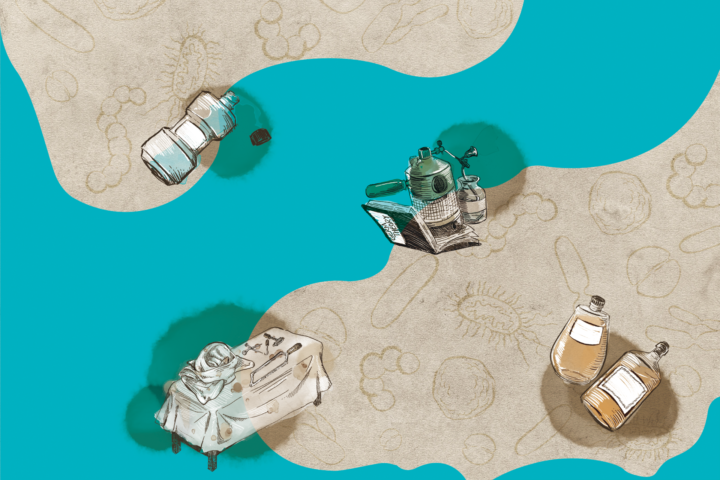The Father of Antiseptic Surgery: Joseph Lister
By Dana Kim 金娥凜

Let’s start with a riddle. What is the translucent, blue liquid that sits around the bathroom shelves in typical households? You can swish this around your mouth, but you cannot ingest it.
Perhaps, you know the answer by now. That’s right – we are referring to a mouthwash!
To understand the inspiration behind the invention of modern mouthwash, we need to go back to history, specifically to the 19th century, to catch a glimpse of the development of antisepsis, which refers to the prevention of infections on living tissues by eliminating harmful microorganisms. The British medical scientist, Joseph Lister, was an important figure who paved the way for the development of antisepsis.
Unexplained High Surgery Mortality Rates in the 19th Century
Back in the 1860s, people were not aware that the culprit of infections was actually microorganisms. Although the idea that microorganisms can cause disease was established and promoted by Louis Pasteur’s famous experiments around that time, medical professionals failed to associate the germ theory of disease with wound infections. Therefore, medical procedures remained surprisingly primitive by today’s standard. For example, surgical tools were solely cleansed before being placed away for storage. Bed linens were not washed [1] and the same probe was used on the wounds of multiple patients to search for undrained pus [2]. Furthermore, pus was even thought to be a natural component of the healing process – known as “laudable pus” – but they are, in fact, a clear indication of inflammation [3].
As a result, cross infection was very common, especially in surgery, which could lead to gangrene (footnote 1) and deaths [4]. Without knowing the root cause, many surgeons have accepted wound infection to be an inevitable complication of surgery [4]. Some doctors were therefore calling for the abolishment of all surgery, advocating that “the abdomen, chest and brain will forever be closed to operations by a wise and humane surgeon [2].”
Introduction of Antiseptic Procedure by Lister
This was when Joseph Lister stepped in – inspired by a paper by Pasteur on the use of creosote to disinfect sewage, Lister selected to use carbolic acid (phenol), a newly isolated active ingredient of creosote, to kill germs on the wound and the air above, preventing them from invading the surgical wounds [2, 5].
At first, many scientists were against his idea, as some were nonbelievers of the germ theory [6]. The mainstream belief was that it is the miasma released by the wound itself that causes infections, instead of pathogenic microorganisms, so doctors would wrap the wound with impermeable dressings to insulate the wound from miasma [2, 5]. In addition, some surgeons argued that the antiseptic process would hinder the progress of an operation, in which every second could be crucial to the patient’s survival [4]. However, it was evident that the incorporation of antisepsis prevented major infections from operations, reducing the death rate of Lister’s patients from 46% to 15% [4].
Consequently, the concept of antisepsis became accepted in other countries. Initially, doctors in Germany adopted Lister’s antiseptic procedure, followed by those in the United States, France, and the United Kingdom [2, 7]. It can also be concluded that Lister allowed a broader range of operations to be performed, for instance, abdominal and other intracavity surgery [2].
Inspiration for the Invention of Modern Mouthwash
Inspired by the use of carbolic acid for antiseptic surgery, Dr. Joseph Lawrence and pharmacist Jordan Wheat Lambert set out to invent an alcohol-based surgical antiseptic. They eventually formulated an antiseptic in 1879 with no specified application [8]. The product failed to take off as a floor cleaner or a cure to dandruff, but became popular after being marketed as an oral care product to prevent plaque and gingivitis [8]. Dr. Lawrence named the modern mouthwash after Joseph Lister – Listeri…a household name you must know!
Mouthwashes are now a daily necessity sitting around our bathroom shelves, but its development involved at least three prominent scientists in history – Louis Pasteur, Joseph Lister and Joseph Lawrence. So, next time you rinse your mouth with mouthwash, why not take a moment to thank these scientific superheroes?
1 Gangrene: The death of body parts caused by a lack of blood supply. Bacterial infection can cause tissue swelling that reduces or stops the blood supply, and eventually lead to gangrene.
References:
[1] Ackerknecht, Erwin H., and Charles Rosenberg E. A Short History of Medicine. Revised and Expanded edition, Johns Hopkins University Press, 2016.
[2] Pitt, Dennis, and Aubin, Jean-Michel. “Joseph Lister: Father of Modern Surgery.” Canadian Journal of Surgery, vol. 55, no. 5, 2012, pp. E8-E9, doi:10.1503/cjs.007112
[3] Freiberg, Jeffrey A. “The mythos of laudable pus along with an explanation for its origin.” Journal of Community Hospital Internal Medicine Perspectives, vol. 7, no. 3, 2017, pp. 196-198, doi:10.1080/20009666.2017.1343077
[4] “Joseph Lister and the Use of Antiseptics – Attempts to Treat and Cure Illness and Disease – WJEC – GCSE History Revision – WJEC.” BBC, www.bbc.co.uk/bitesize/guides/zwkm97h/revision/5. Accessed 21 Jan. 2022.
[5] Ambrose, Charles T. “The Conquest of Pus — a History of Bitumen, Creosote and Carbolic Acid.” Journal of Infectious Diseases & Preventive Medicine, vol. 6, no. 2, 2018, pp. 1-8, doi:10.4172/2329-8731.1000179
[6] Walker, Kenneth M. Joseph Lister. Hutchinson & Company, 1956.
[7] Metchnikoff, Elie. The founders of modern medicine: Pasteur, Koch, Lister. Books for Libraries Press, 1971.
[8] Fine, Daniel H. “Listerine: past, present and future–a test of thyme.” Journal of Dentistry, vol. 38 Suppl 1, 2010, pp. S2-S5, doi:10.1016/S0300-5712(10)70003-8